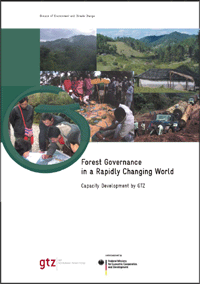
| PUBLICATIONS
|
||||
| Embedded in ongoing
international and regional forest policy dialogues, GTZ implements
forest-related capacity development programmes in about 50 countries
and regions. Three years prior to the United Nations International
Year of Forests, in 2011, GTZ reflects on the impacts of its capacity
development work over the past few years and presents a vision of
how to address future challenges in forest governance. |
|
|||
| |
|
• National development policies and strategies most often
do not sufficiently prioritise the forest sector, which leads to
a lack of public financial resources.Because of legal uncertainty
and political risks in producer countries, private investment often
cannot be mobilised. |
||




